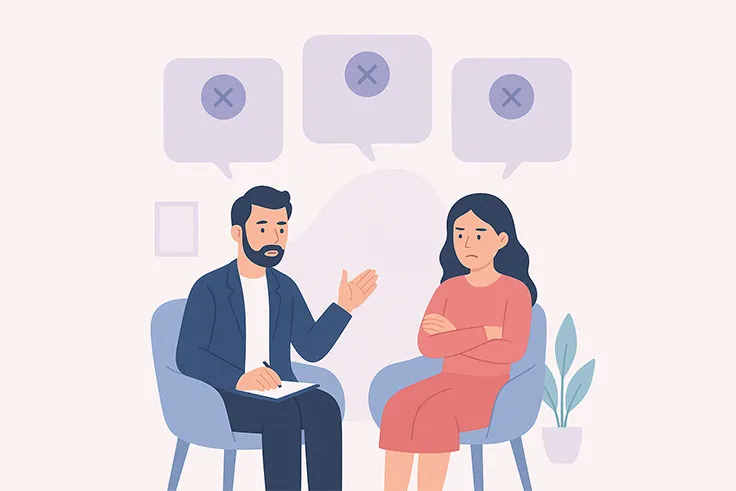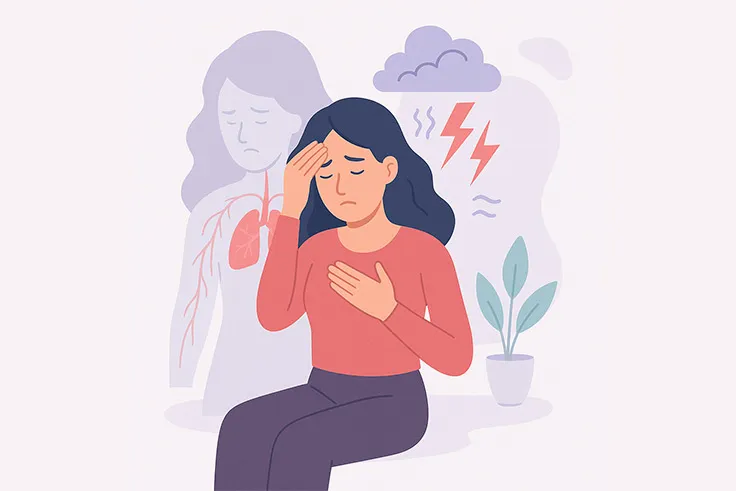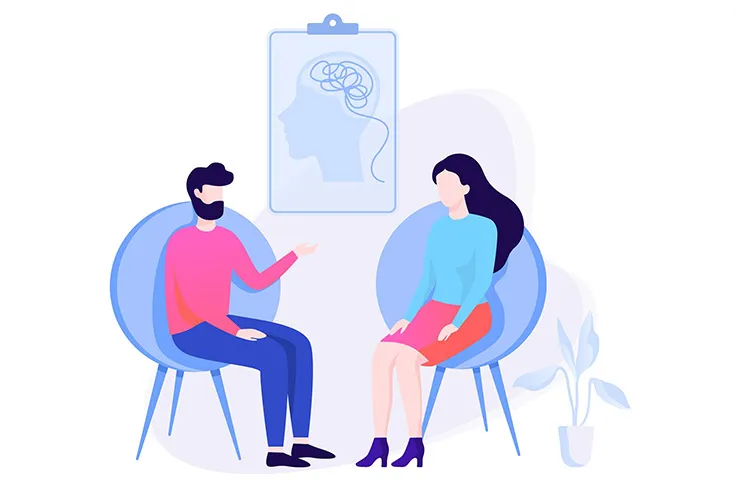
Eating Disorders
Eating disorders are a group of mental illnesses that are characterized by abnormal eating habits which are associated with severe distress and body image issues. Such eating habits can severely impact a person’s physical and mental well-being. The eating disorders mostly develop in young females, however anyone can develop such a condition regardless of what age group they are in, or what gender they are, etc.
Over 70 million people worldwide are affected by eating disorders. Anorexia nervosa has the second highest mortality rate of all the mental illnesses. Thus, the severity of eating disorders and their negative impact on the millions of people that they affect, cannot be left neglected. The first thing that you must do if you are concerned for yourself or a loved one ,who could be suffering from an eating disorder, is contact a doctor who understands this condition and ask for a check-up, immediately.
Eating disorders cannot be cured, just like how other mental health conditions can’t be cured, but their symptoms and the distress that they cause can be considerably reduced with the help of a proper treatment plan.
Types of Eating Disorders
There are 4 major types of eating disorders that are discussed below:
- Anorexia Nervosa: The person suffering from anorexia nervosa has an intense fear of gaining weight, has a disregard for the objective definition of a healthy body. They generally have a severely unrealistic body image that they want to achieve. At the same time, they view themselves as ‘fat’ and want to achieve a body shape that can be called ‘skinny’. They have a very unhealthy obsession with food and exercise. They often purge themselves through inducing vomiting and abusing laxatives. These habits lead to brain damage, organ failure, a decrease in bone density, heart problems, and infertility. They can even lead to death in extreme cases.
- Bulimia Nervosa: A person suffering from bulimia nervosa is, in a way, ‘trapped’ in a loop that has alternative phases of bingeing and purging. Bingeing periods involve eating excessively large portions of food in a very short amount of time. These periods are typically followed by a period of excessive exercise. The purging period involves self-induced vomiting and laxative abuse. People with bulimia nervosa judge themselves and their bodies very harshly. These symptoms have an effect on physical health as well, as people suffering from bulimia nervosa have severe gastrointestinal problems, dehydration, heart problems, and electrolyte imbalance.
- Binge-Eating Disorder: People who suffer from binge-eating disorder often lose control over their eating habits and such behaviour isn’t followed by the purging phase, unlike in bulimia nervosa. A person with this disorder is highly likely to be obese and have other physical ailments as well such as heart conditions, diabetes, etc. Binge-eating disorder is also associated with intense feelings of guilt, shame, and embarrassment due to their eating habits.
- Orthorexia Nervosa: A comparatively lesser-known illness, orthorexia nervosa is characterized by an obsession with extreme exercise and ‘healthy’ foods. Orthorexics do not eat or at least avoid dishes with oil, carbohydrates, butter, etc. as much as they can. They eliminate many foods from their diet. Orthorexics usually aim to build a healthy body unlike anorexics who wish to lose weight.
Common Signs and Symptoms of Eating Disorders:
Emotional & Behavioural Symptoms:
- Behaviours and attitudes in general indicate weight loss, dieting, etc. becoming the primary concerns
- Rejection of certain foods, which develops into a rejection of whole food groups or categories of foods (no carbohydrates, no fats, etc.)
- Preoccupation with weight, body shape, calories, inch loss and weight loss, diet fads, etc.
- Withdrawal from usual social activities
- Uncomfortable eating around others
- Extreme mood swings
Physical Symptoms:
- Significant fluctuations in weight
- Menstrual irregularities
- Stomach cramps
- Anemia, low thyroid and hormone levels, low white or red blood cell counts, etc.
- Dizziness upon standing
- Fine hair on body/lanugo
- Impaired immune system
- Swelling around the area of salivary glands
- Cuts and calluses on the top of finger joints
- Poor wound healing
Causes of Eating Disorder
There are many factors associated with the development of eating disorders. The exact cause of eating disorders cannot be identified, or at least hasn’t been identified yet. But an intermix of several factors from different groups is associated with their onset and further worsening. They’re as follows:
- Hormonal problems
- Genetics
- Nutritional deficiencies
- Poor body image
- Poor self esteem
- Dysfunctional familial environment
- A career in which an ‘ideal body’ or being slim is promoted
- Childhood trauma
- Peer pressure
- Stressful life challenges
Treatments for Eating Disorder
The complexities and physiological manifestations involved in the eating disorders make it very essential to have a very good team of mental health professionals available so that a really good treatment plan can be devised. They address all the dimensions of the illness since eating disorders affect every part of a person’s life. At Incontact, we know that treatment plans need to be extremely adaptable to the client’s needs as every person is unique and has unique problems when tackling a mental illness. We at Incontact provide support and help for clients with eating disorders in Singapore and depending on the client needs apply an eclectic approach involving all concepts and skills that are best suited.
A treatment plan for eating disorder involves the following:
- Medical care: The main problem in eating disorders is addressing all the health issues that the client faces which need to be immediately treated.
- Nutrition: People with eating disorders have many nutritional deficiencies which need to be immediately addressed as well because if left untreated they can lead to major physical problems that may or may not be permanent and may have lifelong effects.
- Medication: Some medications can be given for reducing mood and anxiety related symptoms that are associated with eating disorders. However, they cannot cure eating disorders.
- Psychotherapy or counseling: Many forms of psychotherapy can be incorporated depending on the client’s condition and specific needs. They are:
- Cognitive Behavioral Therapy: Cognitive behavioural therapy helps resolve any cognitive distortions that are the source of the client’s problems. These distortions are ultimately the cause of their behaviour and emotional disturbances. The deeply rooted body image issues, trauma related problems, familial issues etc can be addressed with CBT. CBT is considered to be one of the most effective forms of therapy which is used for a wide range of psychological problems and illnesses. The results of the therapy can be seen within 2-3 sessions and usually a CBT based psychotherapeutic treatment lasts about 10 sessions, or a few more.
- Family-based Therapy: Family based therapy is typically effective for the younger clients, that is, children and adolescents with eating disorders. FBT makes sure that the whole family is involved in their child’s treatment and helps in the development of good eating habits.
Frequently Asked Questions about Eating Disorders
Q. Can eating disorders be fatal?
Yes, eating disorders have the second highest fatality rate among all mental illnesses. It is very important to find a doctor as soon as you think you can identify a few or all of the symptoms of an eating disorder. Consult the doctor and ask for a check-up ASAP.
Q. What should I do if I think I have an eating disorder? I’m afraid to disclose it to my loved ones.
It is a brave yet an important step to reach out to the ones that you love and trust. Most people report feeling relieved when they’ve told someone. However, with their support, you must seek professional help as well.
Submit a Comment
Your email address will not be published. Required fields are marked *
Related reading
What Not to Expect from Therapy: Dispelling Common Misconceptions
24 April, 2025
You finally booked your first therapy session, nerves and hope swirling inside you. Maybe you’ve heard that therapy can work wonders – and it can. In f...
It’s Not Just in Your Head: How Trauma Affects Your Body and How You Can Heal
23 April, 2025
Have you ever noticed aches, fatigue, or tension in your body after a stressful or traumatic experience? If so, you’re not alone. When we think of trauma...
How to Prepare for Your First Therapy Session: A Beginner’s Guide
5 March, 2025
Choosing to begin therapy is a courageous and empowering decision. It signifies your willingness to invest in your mental and emotional well being, it’s ...





